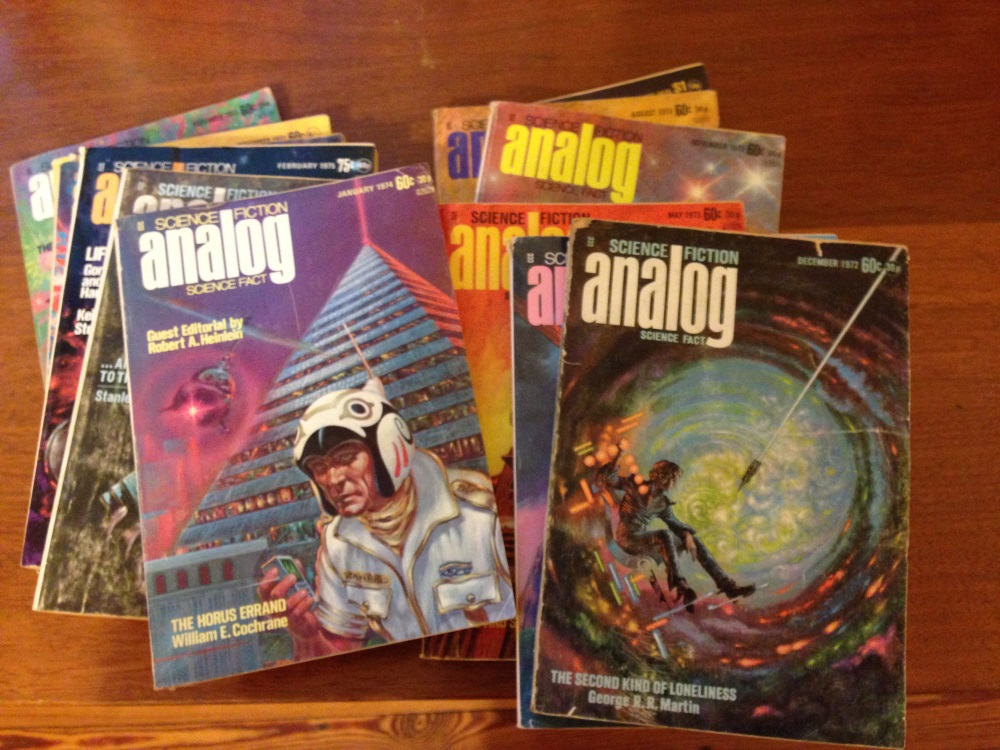 Before the internet, kids who were geeks were pretty lonely. Take it from me. Geeks nowadays have vast networks of geeks around the globe with whom to connect. And science fiction is now mainstream. Not so in the early 70s, when I was on the precipice of puberty and discovered science fiction. It was not to be talked about.
Before the internet, kids who were geeks were pretty lonely. Take it from me. Geeks nowadays have vast networks of geeks around the globe with whom to connect. And science fiction is now mainstream. Not so in the early 70s, when I was on the precipice of puberty and discovered science fiction. It was not to be talked about.
I didn’t know anyone else who read the stuff. I barely came out of the closet. At one point I was friends with a kid whose father worked for Ballantine Books, one of the great sf publishers at the time, and I admitted my interest in sf to him. I hoped the friend wouldn’t tell others.
During the height of my sf obsession, ages 10-14, years 1969-73, I satisfied my appetite for the genre by a) regularly shoplifting paperbacks at the Oxford Valley Mall and b) subscribing to Analog magazine. Method A lasted quite some time. The mall had two bookstores (imagine!) and I’d buy a novel in one store, then go to the other and slip a second book into the bag. Two for the price of one. My allowance could not keep up with my reading, so I truly believed I was justified in doing this. This rationalization, of course, conveniently ignored the existence of libraries.
But now to Method B: Analog Magazine. Every month a new issue arrived, with a novella, short stories and a science fact article or two. Each issue arrived, perhaps not coincidentally, wrapped in brown paper. My weekends were often spent quietly pouring through them. Most of the science fiction was ‘hard sf’ — nuts and bolts, scientifically plausible sf, reflecting the nature of its founding editor John W. Campbell and his successor, Ben Bova. I had begun reading Analog during the end of Campbell’s life and tenure there, but most of Analog years were while Bova edited. (I remember learning at one point that Bova lived in Philadelphia, and I imagined finding his house and knocking on his door to tell him how great the magazine was).
Some of the stories were written by masters of sf: Jerry Pournelle, Vernor Vinge, Gordon Dickson, Stanley Schmidt (who succeeded Bova as editor), Anne McCaffrey, Harry Harrison. Others by writers never to be heard from again. And some by young writers who found their way out of the slush pile, and appeared in Analog at the start of what would become long careers, such as a 23-year old fledgling writer named George R.R. Martin, who sold one of his first stories to Analog in 1972. (That’s his cover story in the photo, the issue on the right). These writers had limitless imaginations, and they taught me that not to place limits on my own.
By high school I fell in with different crowd and stopped reading sf for fear of being, well, outed. It was an unforgiving group. (I remember catching flack because I had read Honor Thy Father, the 1971 nonfiction book about the Bonanno crime family. The author was Gay Talese, and word quickly spread that I was reading gay books. Teenagers are merciless). I let my subscription to Analog, then about $7.50 a year, lapse.
Still, for years I saved every issue, carting them around in shopping bags from move to move like they were gold. They were kept, literally, in the closet. But at some point I lost interest, and tossed the issues. It was only as an adult, confident in my own tastes and predilections, that I returned to reading sf, and by then, thanks to Star Wars and the like, it was fully mainstream. No need to be in the closet. Over the years I’d occasionally regret throwing the stacks of Analogs out.
But recently… a used bookstore opened on Germantown Avenue (replacing a now-obsolete video store). In my first visit I found not only an extensive science fiction section, but a shelf with old issues of Analog, many of them from the very period in the early-to-late seventies when I’d subscribed. I remembered the stories! I remembered the covers! I remembered the feeling of discovery that I felt as a pre-teen reading this stuff. I bought twelve issues, each of which I owned years ago.
This newly-acquired stack of old Analogs sits in front of me as write this, and I feel as though I’ve been re-united with a part of my childhood. The geeky part, the part of which I’m now infinitely proud.
Pingback: Typosphere » Cultural snobbery and the genres